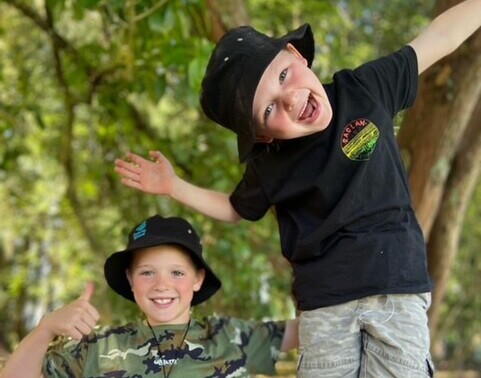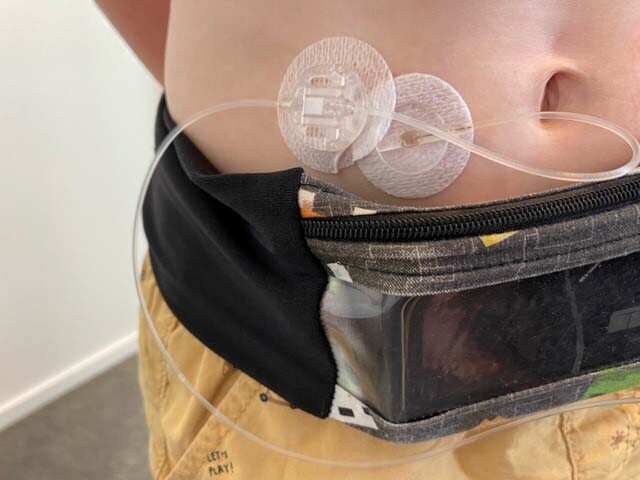For parents John and Sandra Braithwaite, discovering that their nine-month-old son Harry had type 1 diabetes was a shock.
"At first, I was relieved for a diagnosis finally but didn't really understand it. I didn't understand what the future would be like," says Sandra. "I then grieved that Harry wouldn't have a life like his older brother but didn't truly understand the relentlessness and constant worry that was to come."
"We were in Wellington at the time, and it was missed by many medical professionals saying it was a growth spurt.
"He was drinking a lot more than usual, and it was going straight through him. It wasn't until we got to A&E that they tested him, and we found out it was type 1 diabetes. At this point, he was in severe DKA – a diabetic coma."
After spending several days in the hospital, and some exceptional care from the NICU team, they were discharged home with the daunting task of injecting their baby multiple times a day.
Now six years on, Harry is a bubbly seven-year-old, full of life and energy. But Sandra says his childhood is different.
"For Harry, he can't have a day off. There is a constant checking of blood sugars, acting on the result, analysing what to do next and accounting for all his carbs and predicting next steps.
"I am a project manager, but unfortunately, you can't project manage type 1 diabetes. You can't micromanage the many things that affect blood sugars; exercise, activities, sleep, temperatures, excitement, emotions and sickness.
"Harry met the criteria to get an insulin pump, and what that does is help, in some ways, to manage the life of a child with type 1. If he eats every 60-90 minutes, which growing hungry boys do, it means we can attempt to keep up with him."
Sandra explains that type 1 diabetes is a life-threatening condition.
"The reality is that it is life-threatening, so you need to manage it tightly. You have to act immediately; you can't manage it later.
"If Harry doesn't get enough insulin, he will go into Hyperglycaemia (Hyper) and develop ketones which are dangerous, and if he gets too much insulin, he goes into Hypoglycaemia (Hypo) and will go unconscious. Neither are good.
"We check Harry at least once every night, testing his blood sugar. We feed him if he's too low or use his pump to correct him if he's too high. It's exhausting, but it is what it is and must be actioned.
"We had an amazing medical team in Wellington, and now we've been in Tauranga three years and have another amazing medical team here. They are truly talented – particularly when you are in that state of shock and grief because life is never going to be the same again whether you want to believe it or not."
Sandra says Diabetes NZ's Tauranga branch has supported their family immensely.
Alongside connecting the family with other people through events and information evenings, a highlight of the charity's support is the family camp.
"With family camp, you go away as a family, including the siblings. The kids and their siblings did rock climbing, water slides, kayaking and had a heap of fun.
"Being around kids with type 1 diabetes, they see other kids getting finger pricked, counting their carbohydrates for meals and bolusing via their pumps or injecting.
"It shows them that there are other kids that have to do these things that are hard and frustrating and annoy them. The siblings get away and have fun while meeting other siblings who understand what it is like.
"The parents can share stories, attend presentations, talk to like minds and find support to navigate and negotiate the journey. It was so valuable for our family and such a fantastic experience, and we have met lifelong friends through it who help us daily to navigate what life with type 1 diabetes is."
Sandra says Harry is an awesome wee man with a fantastic attitude who loves the bush, anything to do with water, opera, mountain biking with his family in TECT Park and taking their dog.
"Type 1 diabetes hasn't held him back, and we strive for kid first, diabetes second, even though it takes extra management to keep him safe and alive.
"Harry is amongst life despite the challenges he faces, and that is because we are surrounded by amazing groups of people; friends, family, groups and school.
"Pyes Pa School and the MOE support our entire whānau and enable Harry to succeed despite having type 1 diabetes.
"The school focuses on an inclusive culture that puts students at the heart of the matter. The whakataukī from the Individual Education Plan is ‘Te mahitahi kia taea e ngā ākonga katoa te kite i o rātou pūmanawa. Working together to enable all learners to realise their full potential.'
"We've found the school truly lives by this – their support is nothing other than exceptional."
Technology is advancing fast and is making a massive difference to kids with type 1 diabetes, with less finger pricking for blood sugars. Instead, they wear a monitor in the skin which can be scanned to receive the blood sugar reading, or readings can be blue-toothed to a phone or insulin pump.
Continuous Glucose Monitors (CGM) test the blood sugars without the need to finger prick. But it comes at a financial cost and burden to the families. This is currently before Pharmac seeking funding as it is already approved in many countries around the world.
"We will continue to advocate for Pharmac to fund CGMs, which are a life-saving device, not a luxury, so that the financial burden isn't on the parents," says Sandra.
The Tauranga branch of Diabetes NZ provides a range of support and services to people living with diabetes in our community.
This support includes regular information-sharing events with expert speakers, youth events, and family camps, drop-in clinics and one-to-one appointments, and the promotion of diabetes awareness, testing, and healthy lifestyles.
There are many types of diabetes, but the common ones are type 1 diabetes, type 2 diabetes and gestational.
Type 1 diabetes is an autoimmune condition that cannot be prevented, whereby the body sets up an attack against the cells within it that make insulin. Often diagnosed in childhood, it requires daily monitoring and treatment for the rest of one's life.
Warning signs of type 1 diabetes can be excessive thirst, vision change, increased appetite, fatigue, stomach pain and nausea.
These symptoms can often be mistaken for the flu, a cold, upset stomach, virus or strep throat.
Type 2 diabetes is the most common form of diabetes. For many people, but not all, it can be prevented by following a healthy lifestyle.
Gestational diabetes is a form of diabetes that affects some pregnant women. Gestational diabetes most often goes away when a baby is born, but the mother is at a higher risk of developing type 2 diabetes at a later stage of their lives.
Lena Fendley, Diabetes NZ Tauranga Branch Co-ordinator, says symptoms of type 2 diabetes can be similar to type 1.
"But some people don't have any symptoms and can go years without noticing it, so it's always good to get checks from your GP when you're there. It's a simple blood test to check what the average blood sugars are, and if they are on the rise, it's an indication that type 2 diabetes is coming."
Lena says many children are diagnosed with type 1 diabetes.
"Little kids get it younger than a year old like Harry. It can be genetic, but sometimes there's no family history and we don't know why it happens."
Lena explains that for children like Harry, life looks a little different.
"For a five-year-old that goes off to school for the first time, his friends at school are worrying what's for lunch and who will play with them. Whereas kids with type 1 diabetes are wondering what their blood sugar is, how much insulin they will need for lunch and if they are going to go low if they run around at morning tea time.
"It is very complex. It's also a 24/7 job parenting someone with type 1 diabetes. There are no days off, and sometimes there are no nights off."
November is Diabetes Action Month, Diabetes New Zealand's biggest awareness campaign, bringing New Zealanders together to take action for our country's largest and fastest-growing condition.
The annual campaign encourages action, education, awareness and advocacy for New Zealanders with all types of diabetes and their whānau, as well as those at risk of diabetes.
The theme for Diabetes Action Month 2021 is Step Up For Diabetes.
World Diabetes Day also takes place this Sunday, 14 November. Lena encourages everyone to get involved by taking part in the Diabetes Action Month events.
"We have a couple of things going on this month, including Sneaker Friday. Sneaker Friday is a fundraiser for Diabetes NZ where we are asking people to wear their sneakers to work and make a donation of $5 or more, encouraging their workmates to do the same.
"We're doing a Fitbit 250K step challenge, encouraging people to get out there and move a bit more.
"We are also encouraging people with diabetes to get their feet checked by a podiatrist, doctor or nurse regularly. Every year, 600 New Zealanders lose a limb to diabetes that could be prevented.
"It's all about raising that awareness – it's so important to be aware of the symptoms of diabetes and what you can do to live well, and help others live well, with diabetes."
Earlier this year, Diabetes NZ Tauranga Branch was approved TECT funding of $11,500 to go towards their operating costs.
Lena says it is wonderful to receive the funding support from TECT.
"Without grants like TECT's, we wouldn't be able to do the work we are doing. We really appreciate their support over the last five years.
"Operating costs can be quite hard to find, and with things like our family camp, which costs close to $20k to run, it's a lot, so it really makes a big difference.
"Just to have that funding to be able to get out there in the community to start new services and provide support to people that need it, it really means a lot to us."





